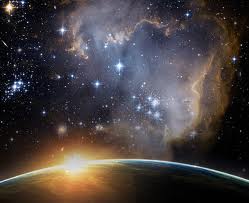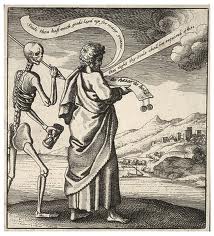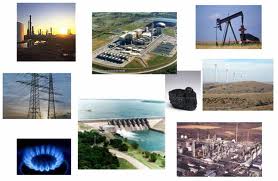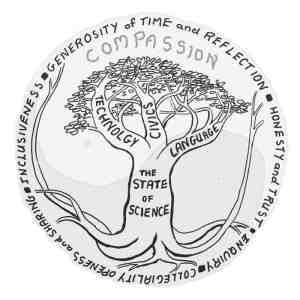|

For at
least seven thousand years now human beings have had the capacity to
alter the flows and balances of Earth’s ecology and climate on scale.
For instance for millennia our uses of fire and construction of rice
paddies have altered the ratio of the warmer trace gases such as carbon
dioxide and methane in our atmosphere and these in turn have affected
the flows of the most potent warmer trace gas of all: water vapour.
Something
changed in the human psyche to enable this to happen and we can only
speculate what that change involved. We can be reasonably sure the ego,
which resides in all human beings, was involved with all its ingenious
capacity for denial of change/stewardship. Our sense of our role in the
universe undoubtedly altered.
We can know
for certain that a major change in the human psyche occurred about 300
years ago. It is possible similar changes had occurred previously in
isolated areas of the planet. However this particular change, which
began in Europe, spread rapidly to every area of the planet. It was
manifest as unprecedented changes to the landscape, waterways and the
oceans; significant changes to the warmer trace gases of the atmosphere;
and an explosion in the number of human beings.
It is
almost certain the human ego was involved though it is difficult to
ascertain how directly. This is because the human ego has an incredible
capacity for self-deceit and is thus beyond the domain of direct
reflective thought. It is amazing how we human beings can be oblivious
to the fact that we can perform actions that are in complete
contradiction of our professed beliefs. This makes self-reflection
difficult. However we can understand the changes in the human psyche by
observing their manifestation. In this case we can observe the massive
soil loss, deforestation, elimination of species, destruction of rare
materials such as mineral oil and the significant increase in the warmer
trace gases caused by recent human activity in what some call the
Industrial Revolution.
We can also
understand changes in the human psyche by observing how the changes are
manifest in our language over this period. All sentient beings, from
individual cells to whales and redwoods, use symbols to survive and
procreate. Its use of symbols determines the viability of any species.
The nature
of symbols presents a grand paradox: the use of a symbol simultaneously
reflects and generates the state of being of any organism.
We do not
know how other species transcend this paradox so they can embrace change
and evolve.

The fact that cells have somehow retained the wisdom to
sustain their current form through one billion years of all manner of
solar, tectonic, climatic and other change is mind-boggling. However we
can reflect on the human mind sufficiently to speculate how we are able
to transcend this paradox of symbols so our species thrives.
The first
step is to embrace the role of the ego in our lives and acknowledge its
incredible ingenuity, its inherent tendency to deny change/stewardship
and the limitations of thought. This step involves the experience of
compassion with its capacities of humility, kind humour and
inclusiveness.
Note: the ingenuity of the ego is incredible because it acts as an
intermediary in our psyche between conscious thought (involving an
awareness of perhaps as few as 2-3 thousand interactions with the
universe in any moment) and the great subliminal part of our psyche
(involving an awareness of maybe more than 50 billion interactions in
any moment.) Consciousness has been likened to a glint on a wave on the
vast ocean of the subconscious experience. No illustration can capture
the essence of change in that glint. It arises and passes in a blink of
the eye. Such is the fluid nature of the ego.
The second
step is to ask what guides might exist that could enable the sustainable
use of symbols. Are there any universal principles of existence? When we
ask this from the perspectives of physics, psychology and known history
we discover that for millennia human beings have been aware of the
Conservation and Uncertainty Principles of Energy to some degree.
The Conservation Principle of Energy reminds us that existence involves
continuous change and transformation even as energy remains a bounteous
constant.
The Uncertainly Principle of Energy reminds us that our awareness of any
change affects that change in ways we cannot know with certainty. Our
information is approximate. We live probability.
Humankind
over the millennia has subjected these principles to the most intense
scrutiny because they form inconvenient reminders to the ego that we too
are mortal forms and it is not the sole authority. So far these
principles are sustained on a universal scale and there is a high
probability that they provide us with wise guides to how we can
transcend the limitations of both thought and the ego. We can use them
to transcend the paradox of symbol use and increase our potential to
develop a sustainable language.
There is
increasing evidence supporting the notion that information is physical.
The generation, storage and propagation of any piece of information can
be known from a physical perspective. Thus we can usefully draw on the
great principles of physics to establish principles of symbol use. I
have generated a draft statement of such a principle, tentatively called
the Sustainability Principle of Energy. This states:
|
A
symbol used in acceptance of change enhances the capacity of the user to
mirror reality and enjoy harmony.
A symbol used in denial of change destroys the capacity of the user to
mirror reality and enjoy harmony.
|
In brief, reality is the
universal continuous transformation or change.

Human beings live a dance
between acceptance and denial of both our mortality and our roles as
stewards amidst continuous transformation. Indeed change and stewardship
can usefully be known as one. This is because stewardship inevitably
reminds us of change and vice versa. Both remind us of the finite nature
of all things, including all human beings. The dance is complicated by
our incredible capacity for self-deceit. We have the capacity to develop
incredible, sophisticated rationales and belief systems denying our
roles as stewards amidst the universal flux.
When we psychoanalyze the
English language using in the Sustainability Principle of Energy we
discover significant changes occurred since the advent of the Industrial
Revolution. In brief, many of the prime symbols in English language have
been stripped of their associations with change/stewardship and this
process coincides closely with the major non-sustaining changes to our
planet’s systems outlined at the beginning of this article.
For instance Earth’s
atmosphere is now commonly symbolised as a greenhouse, a human construct
in which we can engineer air at our will.

It is interesting to observe
the coincidence of two phenomena in Europe. One is the advent of the
massive, unsustainable excesses of the Industrial Revolution. The other
is the adoption by the European feudal elite of large greenhouses as a
symbol of their wealth and power over all. The Crystal Palace of 1851
was a clearly articulated symbol of Britain’s dominion over the seas,
lands and peoples of the planet.


This “greenhouse”
symbolisation works to deny the reality that Earth’s atmosphere is an
organic, dynamic system that sustains us only if we respect its immense
flows and balances. Indeed it has now become common to symbolise
Earth’s climate as the enemy.
  
Our
language now denies the fundamental live-enabling thermodynamics of air
and associates the vital warming process with malevolence. Observe how
global warming is confused with global warming-up – this is a complete
denial of a change of state. We are exhorted to “fight global
warming” and “stop climate change”. A web search on
“greenhouse” reveals how the symbol pervades all our language
relating to Earth’s climate.
Another profound example of
this denial of change/stewardship is the use of the “energy” symbol.
We observe the phenomenon by which our prime symbols such as
“energy”, “power” and “electricity” have been stripped of
most of their sustaining potential. Now, since they redefined the symbol
in the 1950s, energy is commonly associated with a limited range of
industrial products owned by the global oligarchy of bankers. Much of
the global culture is now based on the fatally flawed Anglo-American
energy equation:
Energy
=fossil fuels = power = electricity = Bulk-generated electrical
products.
All our major institutions
now use these symbols interchangeably, most of our modern systems are
based on this delusion and the addictive use of fossil fuels and
Bulk-generated electrical products is endemic. For example:

The
Energy Sector consists of thousands of electricity, oil and natural gas
assets that are geographically dispersed and connected by systems and
networks. Therefore, interdependency within the sector and across
the Nation’s critical infrastructure sectors is critical. The
energy infrastructure provides fuel to the Nation, and in turn depends
on the Nation’s transportation, communications, finance and government
infrastructures. The energy systems and networks cross the
Nation’s borders, making international collaboration a necessary
component of the Energy Sector’s efforts.
-http://www.ok.gov/okfusion/Business_Industry/Energy/index.html
The consequence of this
behaviour is that fossil fuels are vastly undervalued and used as though
they are infinite while sustainable uses of our electrical potential are
ignored.
The lack of science and
general confusion becomes evident if we explore what this energy
equation is really saying. It effectively equates energy (the bounteous
potential of the universes) with fossil fuels (very finite forms) with
power (a measure: the rate that the universal potential is manifest)
with electricity (which does not exist though many electrical phenomena
do) with Bulk-generated electrical products (a finite form). It is a
recipe for misery, or if you prefer, disharmony with all. The equation
manifests the ultimate denial of the great principles of physics.
The complete reversal of the
meaning of the “economic” symbol offers insights into the absurd
denial we are capable of. Before the Industrial Revolution an economy
was associated with a system founded in frugality and stewardship. Now
an economy is associated with a system founded in planned obsolescence,
waste, pollution and unprecedented debt creation. Our universities in
all seriousness call the study of this system the science of economy
rather than the non-science of diseconomy.
Enabling this grand confusion
has been the devaluing of the “science” symbol. According to Online
Etymology, “Modern sense of
"non-arts studies" is attested from 1670s. The distinction is
commonly understood as between theoretical truth (Gk. episteme) and
methods for effecting practical results (tekhne), but science sometimes
is used for practical applications and art for applications of skill.
Main modern (restricted) sense of "body of regular or methodical
observations or propositions ... concerning any subject or
speculation" is attested from 1725; in 17c.-18c. this concept
commonly was called philosophy.”
Science now is widely
understood to be just an amoral way of thinking rather than a profoundly
moral way of being.

Our children are taught it is rarefied body of
knowledge, the domain of an elite “fellowship” of people called
“scientists”. The
association of knowledge with stewardship has largely disappeared and
the “art” symbol is now associated with a narrow range of skills.
The original associations of the “science” symbol with split, rend,
cleave, divide or separate have disappeared along with their reminders
of the great principles of physics.
The paradox is that in
denying the division and separation inherent in our experience of
knowledge we tend to become more disconnected and alienated from the
universal potential. Our behaviour tends to become more discordant and
unsustainable i.e. unrealistic. This confusion is manifest in our modern
education system, which teaches that science is just another learning
area like language, “arts”, “social science”, mathematics etc.
This denies the essential change of the sustainable learning process by
which compassion enables the state of being (science) which in turn
enables all manner of sustaining skills.
In summary, a major change
occurred in the human psyche about three hundred years ago. It coincides
with the so-called Age of Enlightenment. Historians suggest this period
involved an emergence from dogmatic religious beliefs into freethinking
secularism. It is possible to argue in circles endlessly about this. The
thought occurs that we Anglo-Americans simply created new religions.
For instance the adoption of the Greenhouse religion, in which Earth is
portrayed as a planet enveloped by a greenhouse, enables people to
believe humans can control the atmosphere and transcend the seasons and
geography at will.
For instance the adoption of the Energy religion, otherwise known as the
Age of Energy Consciousness, enables people to believe that humans can
save, conserve and generate energy. Underlying this belief system is the
notion that the great principles of physics are no longer relevant.
For instance, the adoption of the Environmentalism religion, in which
the environment is symbolised as a world separate to us, in particular
an ecology separate to us, that needs saving. It is founded in the
belief that speaks of humans and their environment rather than the
belief that says humans are their environment
For instance, the adoption of The Market religion, in which a certain
type of market -that controlled by the global oligarchy of money traders
– is imbued with supernatural powers of wisdom and stewardship. It
commonly attributed with all the feelings and emotions of human beings
e.g., “The Market liked, did not like, punished, rewarded, reacted
today to the news...”
As I suggested, it is
possible to argue endlessly and be no wiser for the discussion. The ego
thrives on such futile discourse for it can more easily dominate our
sensibilities.
Alternatively we can embrace
the ego with all its trickery and its tendency to deny
change/stewardship while looking for evidence of its activity in our
language and landscapes.
The Sustainability Principle of Energy provides us with the ability to
systematically explore the potential of a symbol to be used in denial
and acceptance of change/stewardship. It is possible to construct
indexes of these uses. As you can see with the index
at the The
Sustainability Principle website, there is overwhelming evidence
that the ego now has an enhanced, profound influence in our lives. What
is fascinating is that all the symbol uses in this catalogue are drawn
from the literature of the Environmental Movement. This illustrates that
even though we may be very well meaning and caring the ego can still
easily make us our own worst enemy.
Similarly we can observe how
humans have for hundreds of generations had the capacity to destroy most
of the forests and soils of this planet. It is a fact that most of the
forests and soils that had built up over eons still remained three
hundred years ago. Since then we have destroyed much of them and, within
the last two generations, we have also converted most of the immense
wealth potential of mineral oil/gas into pollution.
The overwhelming evidence
suggests that the ego has come to dominate our lives to an unsustainable
degree. We each retain elements of psychosis and psychopathy. However
these elements are now manifesting in their purest forms in our modern
institutions.

http://en.wikipedia.org/wiki/The_Corporation_%28film%29
People are increasingly disempowered. The question arises:
so how can we transcend the limitations, needs, demands and ingenious
trickery of the ego?
Sages over millennia have
explored the role of the ego in our lives and a general consensus has
emerged that the best answer to this question is the experience of
compassion. They suggest it is helpful to embrace the ego with
sensations of humility, inclusiveness and kind humour. The innate
tendency of the ego for denial of change/stewardship wanes with this
experience. Compassion releases us so we are better able to accept the
universal transformation and enjoy greater harmony with all.
The question arises: how
might this occur in our contemporary society with its many insane
institutions and delusional behaviours. Perhaps our greatest hope lies
in our children. Recent research into child development provides
increasing evidence that children are born into the states of compassion
and science. They enjoy a far greater spirit of inquiry and rigorous
experimentation than many realise. Similarly they have a far greater
sense of intent and morality than many suppose. They form a vital
reminder of our greater potential. So really it is a matter of reshaping
our education systems so this potential is not destroyed.
This may be easier to
accomplish than first imagined because many child- carers are intimately
reminded every day of the great potential of our children. They
experience a constant and perhaps inexplicable feeling of our current
education curriculum framework working against their sensibilities. Many
child carers would embrace a Compassionate Education Curriculum
Framework, for it would bring enhanced clarity, meaning and purpose to
their work. And as they witness the continuing empowerment of children
they will find they too are empowered.

The Compassionate
Curriculum proposed at the The
Sustainability Principle website does not require the immediate
tearing down of our school buildings or the wholesale binning of current
textbooks. Fundamentally it just requires the experience of a little more
compassion with its capacities for humility, inclusiveness, honesty and
trust. This will, for instance, enable the architects of our formal
education system to identify the trickery of the ego and value perceived
errors as wonderful learning opportunities. A more compassionate
education system means our children will then tend to grow up enjoying
greater potential and more sustainable lives.
Similarly
embracing the Sustainability Principle of Energy brings clarity and
empowerment to our communications. The principle provides no easy answer
for it requires we constantly evaluate our symbol use for potential
denial of stewardship/change and find humour in the incredible ingenious
trickery of the ego. However each time we transcend the limitations of
the ego we are reminded in the greater, sustaining potential of the
universe(s). Unimagined sustaining possibilities become manifest when we better
conserve the potential of our symbols. The Sustainability Principle is
at once a potent psychoanalytic tool and invaluable guide.
We ignore its warnings about our unsustainable behaviour at our peril.
We embrace its insights into the great principles of physics to our
great benefit.
Enjoy.
Footnote.
Smile.
Chances are already the ego is advising, "I know enough. There are
more important things to attend to now."
If so, simply thank the ego and gift yourself some time to browsing the Compassionate
Curriculum and the Sustainability Principle index.
You may well be pleasantly rewarded by sensations of hope and wonder as
you peruse the list of symbols uses that embrace change/stewardship
while sensations of mirth and wonder may well arise as you perceive the
incredible ingenuity and trickery of the ego in the list of symbol uses
that deny change/stewardship. Do not be surprised if you experience a
greater sense of liberation and power.
This
website is devoted to revealing
the essence of energy so humanity may thrive and our daily lives be
filled with wonderment and awe.
It is a labour of love, dedicated to our
children.
Updates
and Additions
3 August
2012
Towards
a sustainable education system
A graphic
comparison of the New Zealand Curriculum Framework with the
Compassionate Curriculum Framework with brief comment
31
January 2012
A
Practical Guide to Enjoying True Hope
An essay
exploring how the great principles of physics can help identify false
hope and enable the experience of sustaining hope.
5 October 2011
"An
Orwellian Climate"
Letters to
Australasian Chief Science Advisors explaining contemporary confusion in
climate care communication (Prof Peter Gluckman, Prof Ian Chubb, Prof
Tim Flannery, Dr Andrew Glikson )
15 September 2011
The
2011 New Zealand Election Campaign
(A
letter to New Zealand people alerting them to the dangers of the huge
hidden yet in-your-face advertising campaign promoting the sale of our
national assets.)
16 March 2011
Thought
Experiments re the Carbon Trading Ethos
(Originally
designed for the Office of the New Zealand Parliamentary Commissioner
for the Environment.)
26 February
2011
Letter to Radio
NZ
(Contains
reflections on broadcasts and ratings of the sustainability of a wide
range of its programmes.)
29
November 2010
The Joy in the Art of Civics
(Brief reflections on this state of being and the dangers of
Environmental Education)
24
November 2010
Celebrating
Our Climate
(Draft one: A climate education framework founded in the Sustainability
Principle of Energy offering an alternative vision of how we can
communicate the role of humans in Earth's climate processes.)
13
October 2010
Conversation
with NZ Minister of Education (Anne Tolley) re the
sustainability of the national education system. Read the Minister's
letter and reflections on the flaws inherent in the Education Ministry's
response.
4
November 2010
Letter
to the Office of the Parliamentary Commissioner for the Environment
Introduction to the Sustainability Principle of Energy with
discussion of the nature of science.
TOP
|